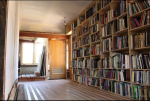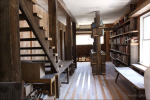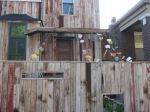Chicago-based artist, Theaster Gates, has developed an expanded practice that includes space development, object making, performance and critical engagement with many publics. Founder of the non-profit Rebuild Foundation, Gates is currently Director of Arts and Public Life at the University of Chicago. Gates’ 2009 project Dorchester Projects is an investment of an abandoned 2 story property that has been recycled and turned into a Library, Slide Archive and Soul Food Kitchen. The Dorchester Projects includes a group of once abandoned buildings on Chicago’s South Side that Theaster Gates then renovated from what appeared to be sites of neglect, into lively cultural environments where the community gathered. Gates originally purchased a once storefront building on South Dorchester Avenue which he made his home before embarking upon the planned two year design-build project, that would be known as the Dorchester Projects, which is continuing to expand within Chicago. Gates began the project when he bought neighbouring two-story vacant houses and commenced a design project to reinstate and resurrect the home as a site of community interaction and uplift. The project was so successful that it led to the development of a third building across the street. With the support of grants, the building will be transformed into a site for film programming and artist residencies.
Gates’ Dorchester Projects utilizes repurposed materials from all over Chicago, giving the project both a practical and expressive aesthetic, connecting the development of new art with the economic reuse of material resources. The Dorchester Projects is an expanding, multi-functional space in which community-driven inventiveness and experiences allow neighbourhood resurrection to exist. This project clearly emulates a model for community building and cultural as well as socio-economic resumption. Moreover, the Dorchester Projects encourages neighbourhoods and local youth to rethink the ways in which we consider living environments as spaces worth reconstructing and investigating. Gates’ project empowers the community to engage in extreme neighbourliness by reconstructing their surroundings and emerging diversity within and amongst them. The Listening Room is large element of the project. Before the listening room was built, the space was a neighbourhood candy store. Gates then redesigned the front room to house 8,000 LPs comprising the final inventory from Dr Wax Records, a former record store in the nearby Hyde Park neighbourhood. The record collection has served both soulful, and educational purposes. The space has promoted and hosted listening parties and DJ events while still being made available to artists and musicians in residence at the Dorchester Projects. The large focus of The Listening Room lead to the collection travelling for roughly a year to the Seattle Art Museum to be installed in the exhibition Theaster Gates: The Listening Room. The plans for the future involve the residential half of the building being renovated into a reading room, and temporary space for the Johnson Library.
Gates speaks of FEAST being an opportunity for Dorchester to open up, and expand across the South Side of Chicago and reactivate spaces. Gates believes that concentrating on the creative practice first, which he describes as “the successful restoration of an abandoned building, and then its occupancy with stuff” will produce a by product that will encourage both people close to him and far from him to become curious and excited about it. Theaster believes that his choice in using repurposed materials that were on their way to becoming waste—over new materials—really adds to the quality of the space. Gates describes the project as something that “could embody ambition, curiosity, and sexiness.” Gates explains the main themes and intentions of the project being hospitality and the economy. Gates wants to ask “What does it mean to be generous to one another?” Moreover, “What does it mean for us to share the abundance of generosity that we have?” Theaster states “we have an opportunity to either live wherever we want—somewhere else—or make an amazing fresh, robust community here.”
Theaster Gates’ Dorchester Projects attracts a wide range of audiences. Despite being on Chicago’s South Side of town, the Dorchester Projects invites a diverse demographic of people. I believe Theaster Gates’ Dorchester Projects emulates the notion of performance of possibilities. Gates is working within the community of Southside of Chicago, sourcing repurposed materials from all around city to renovate abandoned buildings. Following the restoration and reactivation of these buildings, they are opened to the public as sites for community interaction and inspiration. It is evident to see how the Dorchester Projects illustrate the notion of performance of possibility, as the creation of a work, the renovation of the abandoned buildings, culminated in creation and change. Furthermore, the community experience of renovating these buildings evokes the emergence of a voice within the Southside Chicago community. Moreover, the Dorchester Projects place recognition of the audience as the citizens of the community and in doing so, evokes the potential for collective action, which is the foundation upon which the performance of possibilities is based.
The notion of community that is described as the creative energy distinguished by those forced to live with a lack of resources caused by economic or political reason is a space of endless possibilities, which is exceptionally demonstrated by Theaster Gates’ Dorchester Projects. The expanding multi-practical community space of the Dorchester Projects has opened up avenues that cultivate socioeconomic resumption. Moreover, the project encourages the community to engage in the reconstruction of their environment with the notion of extreme hospitality, as they collectively work to revolutionize their community, inviting cultural diversity and inventiveness. The Dorchester Projects continues to emulate the performance of possibilities as the next site being renovated will be a space for a new artist in residency program. The feeling of hope and uplift is evident in the community, despite the violence, gang related crimes and poverty in the Southside Chicago community. There is a clear pedagogical, collective, and aesthetic dialogue taking place within the community regarding its delicate state, which is reflexive in the project as a whole. Author Sibylle Fischer states, “There are no limits here, there are so many things here. No limits to what I can do. Anything you find-just give it to me. Everything they throw in the garbage, I use it. This is the thing you see: old stuff. And then the transformation of objects into new things.” I believe the efforts put forth by Theaster Gates through the Dorchester Projects, will be a model for future projects involving community and the arts. Gates has successfully produced a space in which community can gather and culture may flourish.












You must be logged in to post a comment.